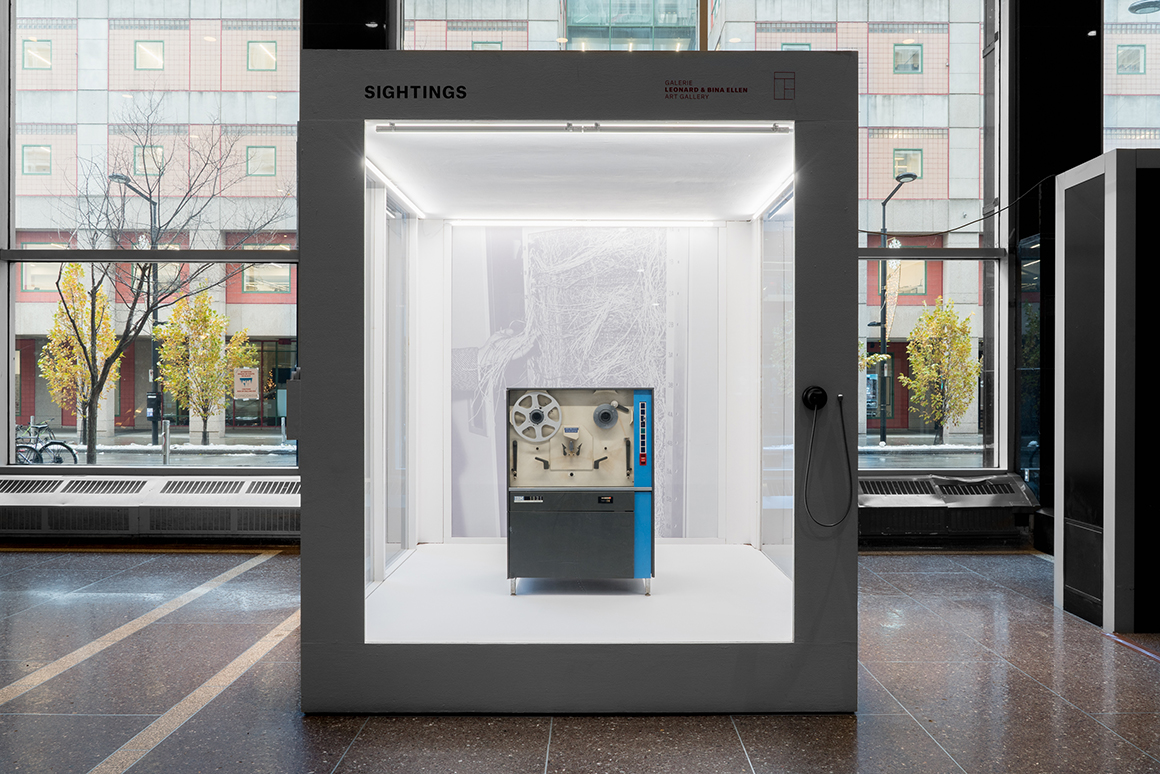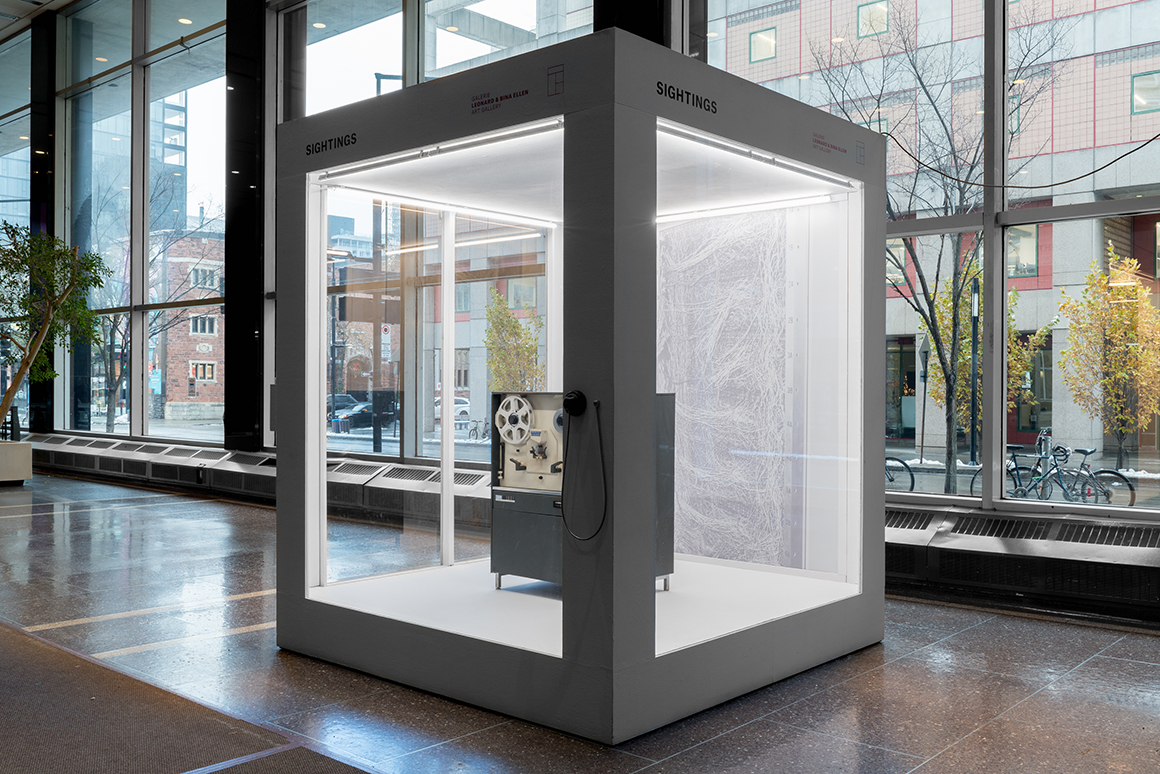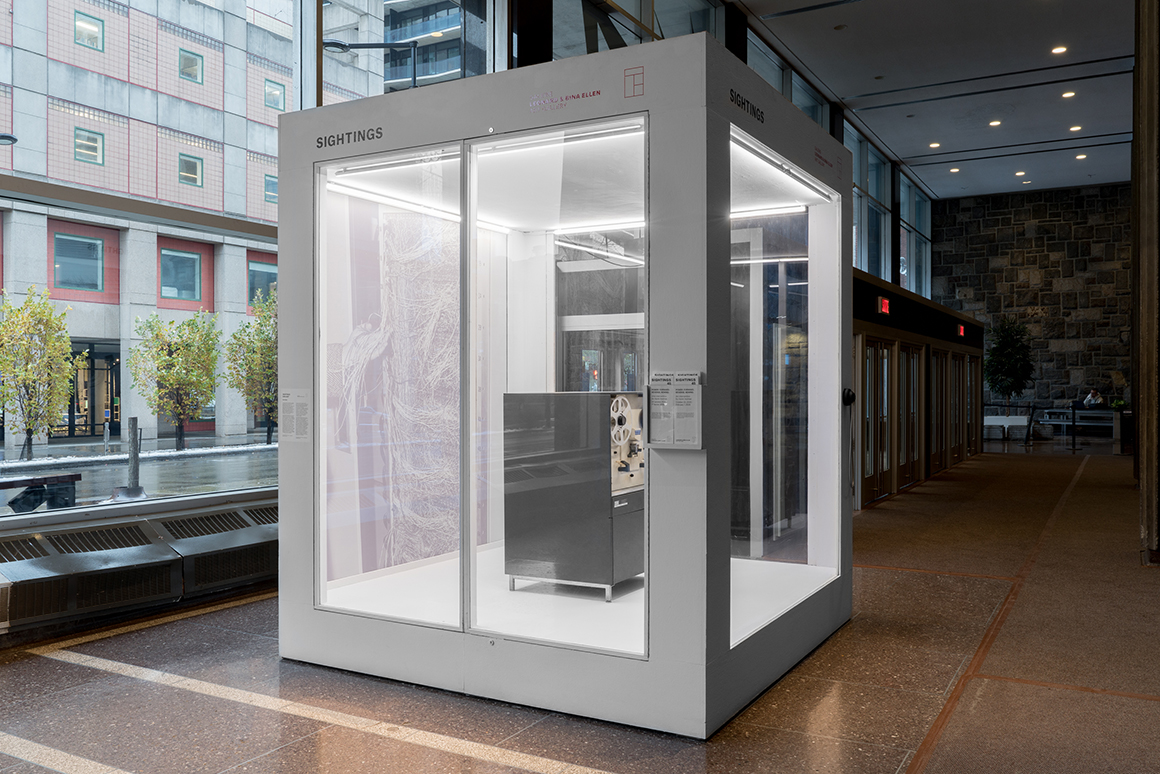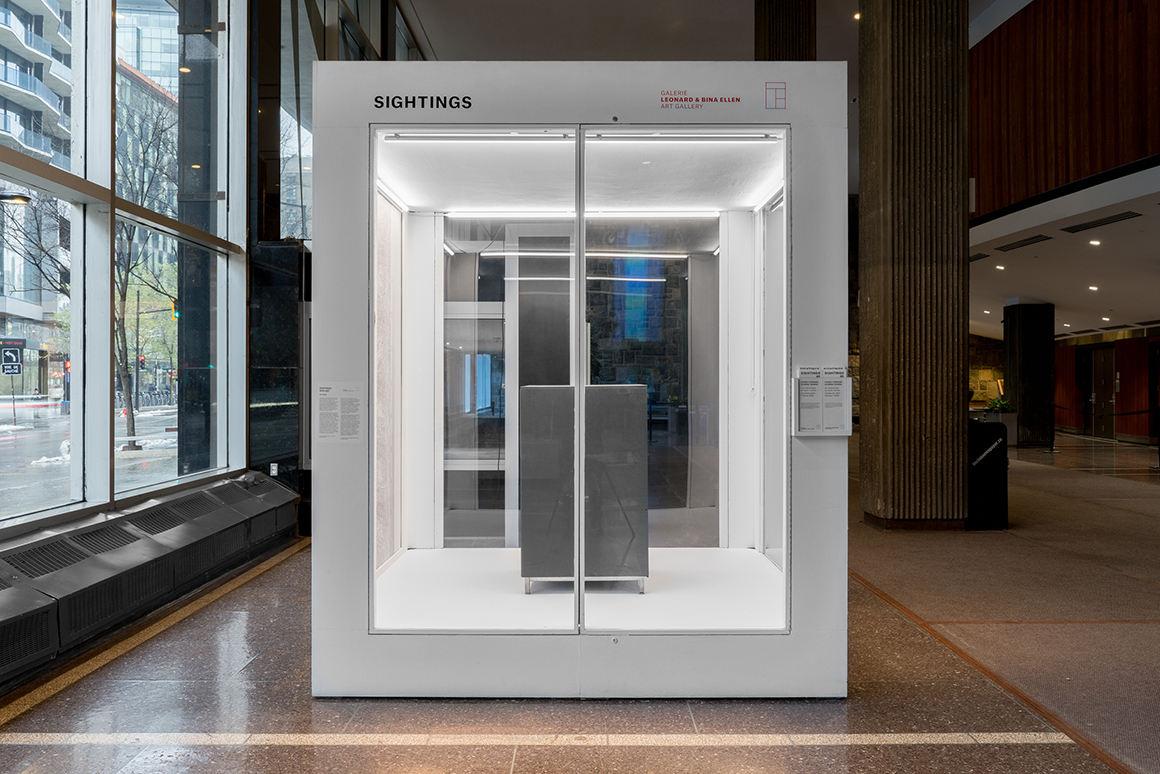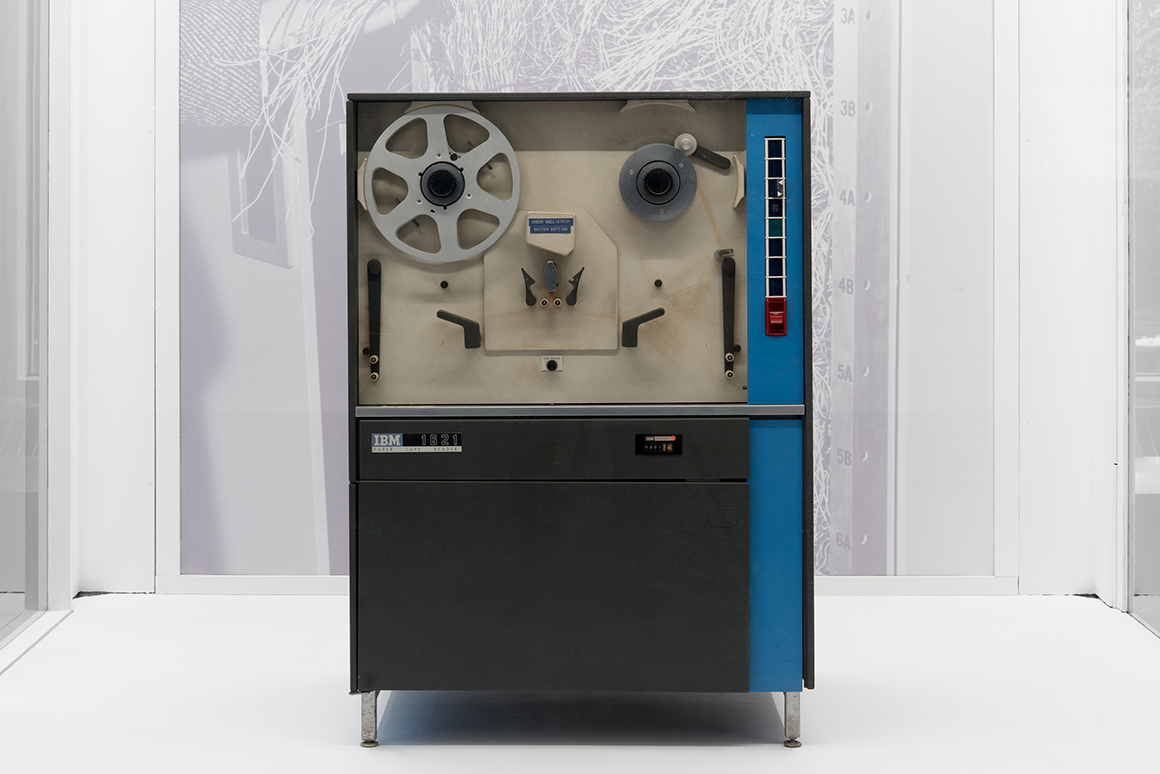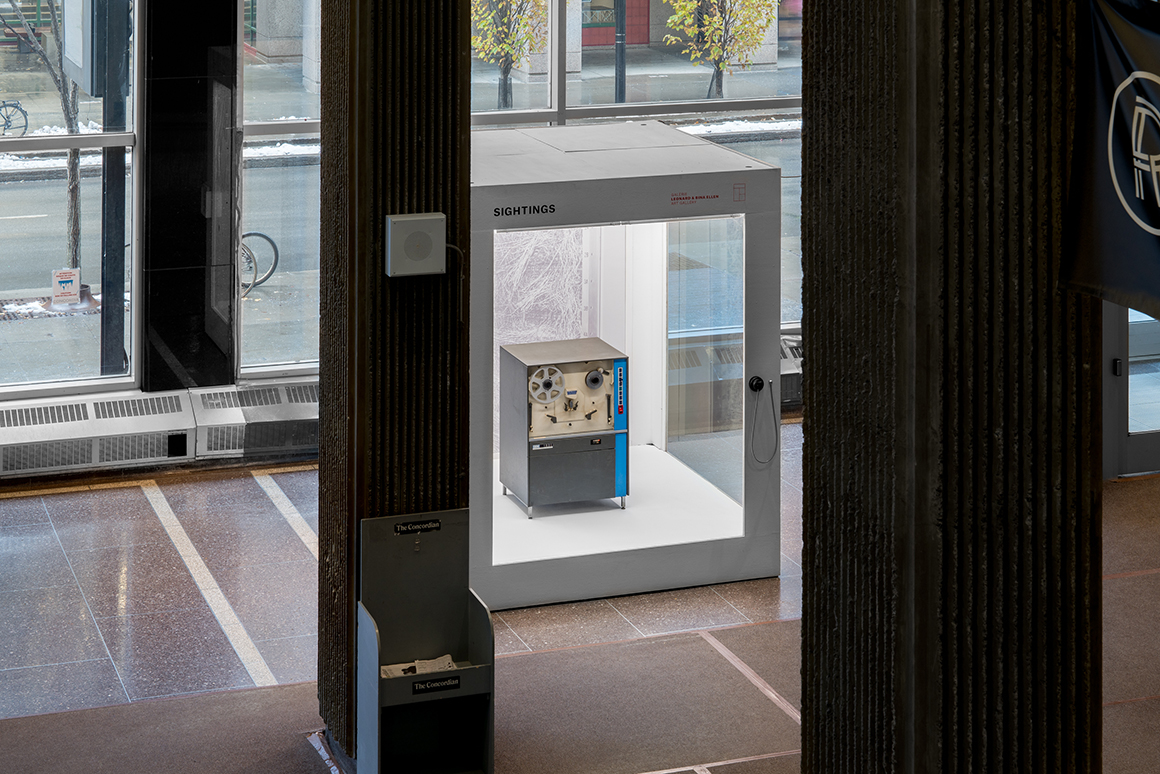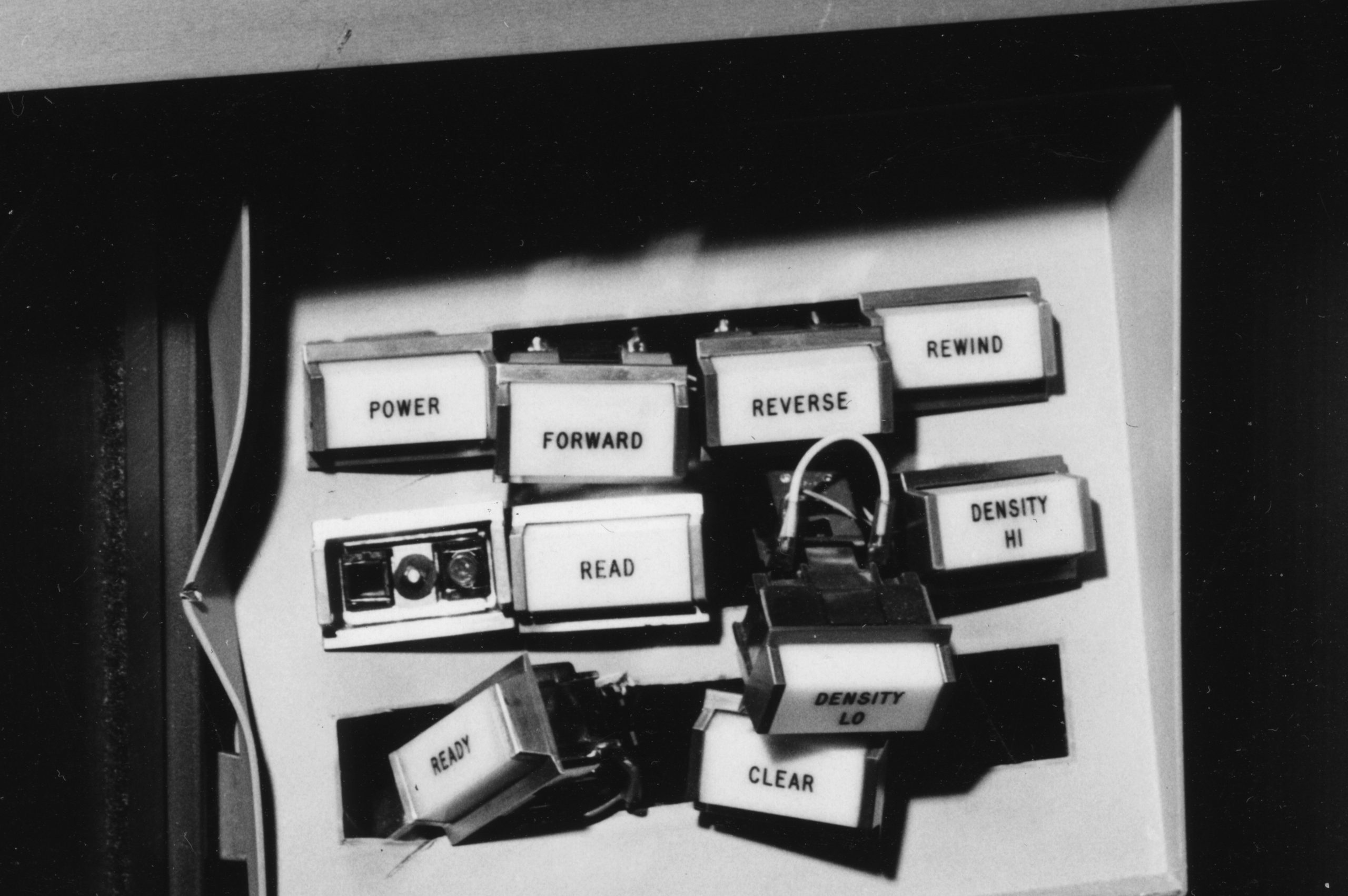SIGHTINGS 2025-2027
Decorum
Launched in 2012 in celebration of the 50th anniversary of the Leonard & Bina Ellen Art Gallery’s Permanent Collection, the SIGHTINGS satellite exhibition program was conceived as an experimental platform to critically reflect upon the possibilities and limitations of the modernist “white cube.” As part of this program, artists and curators are invited to develop projects for a cubic display unit located in a public space at the university, with the aim of generating new strategies for art dissemination.
The 2025-2027 SIGHTINGS cycle, Decorum, engages with the emancipatory histories of Concordia University’s Henry F. Hall Building. Since its inauguration in 1966, the building has been a key site for student activism—from the 1967 lobby sleep-in protest against high textbook prices, where 150 students camped in the lobby, to the landmark 1969 Sir George Williams Affair, marked by a multi-day occupation of the 9th-floor Computer Centre by students and demonstrators to denounce racist grading practices. Originally conceived as a central hub for the downtown student body, the Hall Building remains a space where students gravitate to exchange ideas, mobilize and make their voices heard. The projects presented in SIGHTINGS build on this legacy, reflecting on the memory of protest embedded in institutions and their architecture.
SIGHTINGS is located on the ground floor of the Hall Building: 1455, blvd. De Maisonneuve West and is accessible weekdays and weekends from 7 am to 11 pm. The program is developed by Julia Eilers Smith.
POWER. FORWARD. REVERSE. REWIND.
October 20, 2025 – February 1st, 2026
An intervention by Joyce Joumaa
International Business Machines Co. Ltd., reader, tape, circa 1966, artifact no. 1975.0158, courtesy Ingenium – Canada’s Museums of Science and Innovation, and printed photographs, courtesy Concordia University Records Management and Archives
Joyce Joumaa is a video artist and writer based between Beirut, Amsterdam, and Montreal. After growing up in Lebanon, she pursued a BFA in Film Studies at Concordia University. Her research-based practice employs microhistorical methodologies to excavate the palimpsestic layers of Lebanese social and political formations, examining how colonial and postcolonial structures continue to inscribe themselves upon contemporary spatial and temporal experiences. Central to her practice is the concept of “social psychology”: how built environments and geographic territories become charged with affective histories that continue to shape social relations and collective subjectivities.
Her work has shown at the Montreal Museum of Contemporary Art, the 2nd Sharjah Architecture Triennial and the 60th Venice Biennale. She is the recipient of the 2022 Residency Award Program at the Centre for Canadian Architecture, the 2024 Hnatyshyn Foundation Award for emerging artists, and the 2025 Baloise Art Prize. She is currently a Vera List Center Boris Lurie Fellow (2025–2027).
The following transcript comes from a video recording preserved in the Concordia University Records Management and Archives and publicly available via YouTube. Dated February 4, 1969, the document features faculty and students at a rally to debate the contested ad hoc hearing committee established after black students filed racism complaints against biology professor Perry Anderson. The document is catalogued as follows in the archives:
Title proper: Mezzanine Rally
General material designation: Moving images
Title statements of responsibility: TV Sir George?
Title notes: Source of title proper: Title taken from the document label
Level of description: Item
Repository: Concordia University Records Management and Archives
Reference code: I0074-09-0001
Scope and content: Open meeting on the mezzanine of the Henry F. Hall building in support of the Sir George Williams University black students’ demands. The rally resulted in the occupation of the faculty lounge on the 7th floor by students. Speakers at the rally included Kelvin Robinson of SGWU, Rosie Douglas (McGill), Tim Gabban (SGWU), Sister Coco (Stokely Carmichael’s secretary), Rocky Jones (human rights organizer at Dalhousie University), and Stan Munoz (professor of psychology at SGWU).
[Professor Stan Munoz, 00:01:00]
With regard to the question at hand at the moment, it is my feeling that everybody in this community is involved in the situation. The major issue is not the black students versus Professor Anderson, or racism. It is now a question of an institution and how it responds to certain situations. And that means how it responds to you, me, and everybody else.
One professor at the faculty meeting mentioned the question of human relationships and confidence. And why we can’t get some contact between the parties involved? Why can’t it be that somebody from the administration and black students can sit down together and discuss the demands that are being made? I think this is where the problem is, that the administration can respond in legalistic terms, but not in human terms in the sense that we would make direct contacts. If you don’t demand these things, they’re not going to happen.
It’s what has happened from Berkeley to Prague. It’s what’s happening in many institutions. The questions that come up are very basic and fundamental. As far as I’m concern the questions of racism or the Professor Anderson versus student question might be a symptom, but it’s not what the basic issue is. The basic issue has now moved into the centre of the arena, and everybody must evaluate the facts and make a decision for themselves as to where they stand. You’re all involved. It’s not just a few people anymore.
[Inaudible question from the audience. Munoz continues, 00:03:20]
My view is that a new hearing committee will have to be set up in order to be valid. It’s inconceivable to me that one party—I mean, take it out of here completely, let’s say outside in a court case or something else: if you have one party that’s not going to accept the jury, and the other party does, I don’t see how the case can proceed.
[…]
[Possibly Tim Gabban, 00:07:03]
The central contention is that the Caribbean students, supported by some of the other students of Sir George, disagreed to the constitution of the committee. They think it should be disbanded and reconstituted. Now they say that one of the main contentions is that they were not informed as to the two members that were arbitrarily imposed by the administration.
[…]
[Kelvin Robinson, 00:07:47]
This gentleman is saying that we were invited to attend meetings to discuss the other two members of the committee. To the best of my knowledge, this is not a true statement. The fact of the matter was that we had meetings with the committee, and then we subsequently took exception to Professor Adamson, Professor Bain, and Professor Davis. We sent a letter to the administration […] telling them we didn’t have confidence in these men and felt they should be replaced. We were not invited to any meeting to discuss the replacements of these two men.
[…]
[Robinson continues, 00:09:48]
I want to draw attention to one of the five demands […] That the administration get together with us and Professor Anderson as soon as possible to discuss the setting up of a new hearing committee, the procedure, and the time and date.
When people question us about whether we have facts, or whether Anderson is a racist, they’re just clouding the issue. We have already taken care of having a meeting with the administration to see that a proper hearing is conducted. What we are talking about right now, and where you all are involved, and this is what you have all been running away from […] Fact number one: the administration of this school has been giving black students a run around for almost a year now. Point number two: if this case involved white students, it would have been settled long ago.
First of all, we went through all the legal channels. […] The things the administration did, some people call bungling or incompetence. But it was neither. It was something consciously done. They treated us that manner simply because we were black students. We were given a treatment that was unheard of. There is no university in the world where the treatment that was given to us could be found.
[…]
[Robinson continues, 00:12:43]
Many of you white students are trying to pop out. You are directing attention to things like the hearing […], which is no longer valid as far as you are concerned. We are interested in having a just hearing, but you students are witnessing the administration acting in a most unjust manner, and you’re sitting down […], going to classes as usual, talking nonsense about whether we have proof. That is not vital now.
The vital point is that black students who paid $600 to come to school here are being given a runaround by an administration. This is what white students must address themselves to. No matter whether Anderson is guilty or not guilty, the fact remains that your administration has been acting in a most unjust, a most illegal manner, and yet you come to school every day, and you don’t address yourself, you don’t bring this man to question.
These are the men you have to attack. […] We want a hearing. We want a new hearing committee to listen to this thing in a just manner. That’s our responsibility. The responsibility of most students here is that the administration has been acting in a wrong manner. And this you have not been doing.
[Robinson continues, 00:14:43]
[…]
This archival video document has served multiple purposes over time. In 1970, it was used as evidence against student protesters in court, but it also preserves the voices of black students who were denouncing systemic racial discrimination at Concordia University. Archives often circulate in ways researchers cannot fully trace, and this document shows how the same material can serve opposing purposes across time. Once a tool of prosecution, the video now stands as a testimony to the students’ justified grievances, especially in light of Concordia’s 2022 public apology acknowledging its racist handling of the 1969 protests. Rather than letting its punitive origins define its meaning, the footage can now be used to foreground the students’ experiences and critique the institutional responses that both created the discrimination and then criminalized those who protested it. This shift in purpose demonstrates how archival materials can be reclaimed to serve the very communities they once helped silence.
Joyce Joumaa is a video artist and writer based between Beirut, Amsterdam, and Montreal. After growing up in Lebanon, she pursued a BFA in Film Studies at Concordia University. Her research-based practice employs microhistorical methodologies to excavate the palimpsestic layers of Lebanese social and political formations, examining how colonial and postcolonial structures continue to inscribe themselves upon contemporary spatial and temporal experiences. Central to her practice is the concept of “social psychology”: how built environments and geographic territories become charged with affective histories that continue to shape social relations and collective subjectivities.
Her work has shown at the Montreal Museum of Contemporary Art, the 2nd Sharjah Architecture Triennial and the 60th Venice Biennale. She is the recipient of the 2022 Residency Award Program at the Centre for Canadian Architecture, the 2024 Hnatyshyn Foundation Award for emerging artists, and the 2025 Baloise Art Prize. She is currently a Vera List Center Boris Lurie Fellow (2025–2027).






